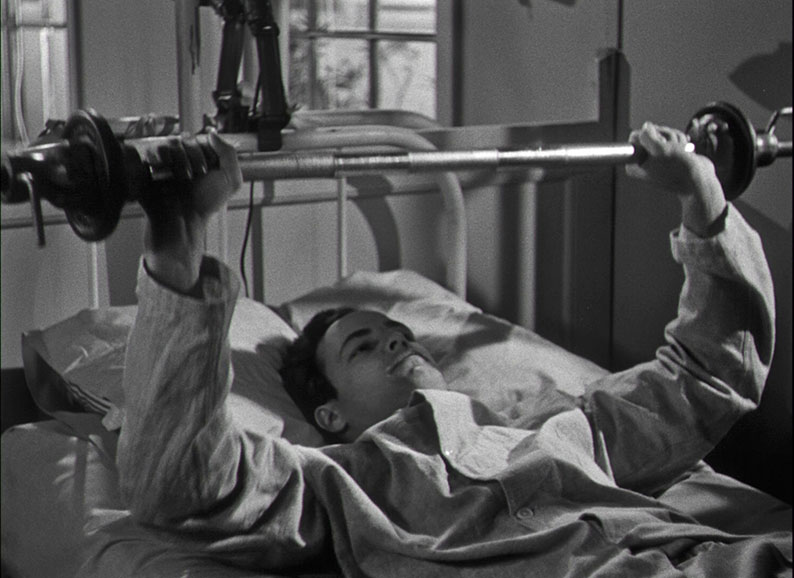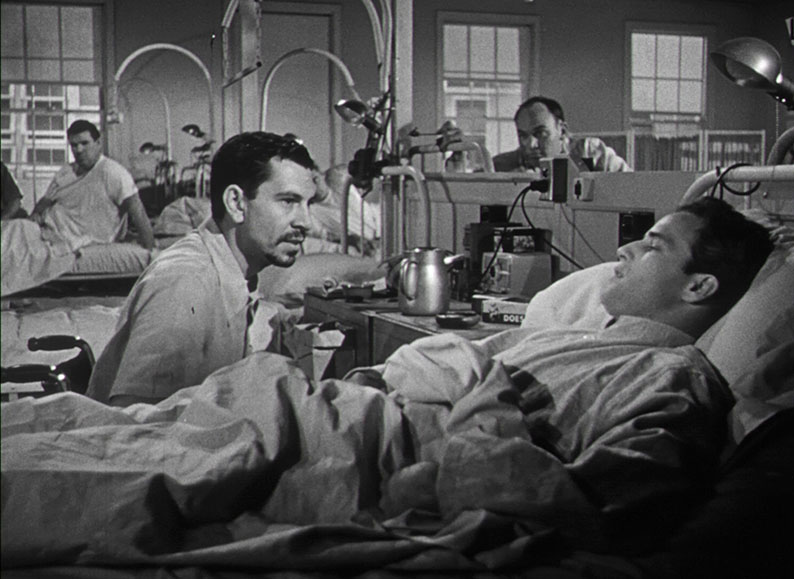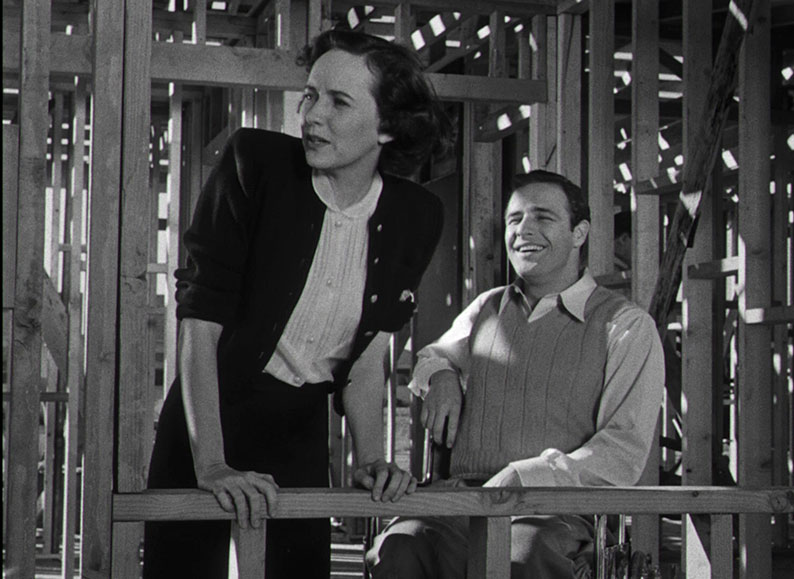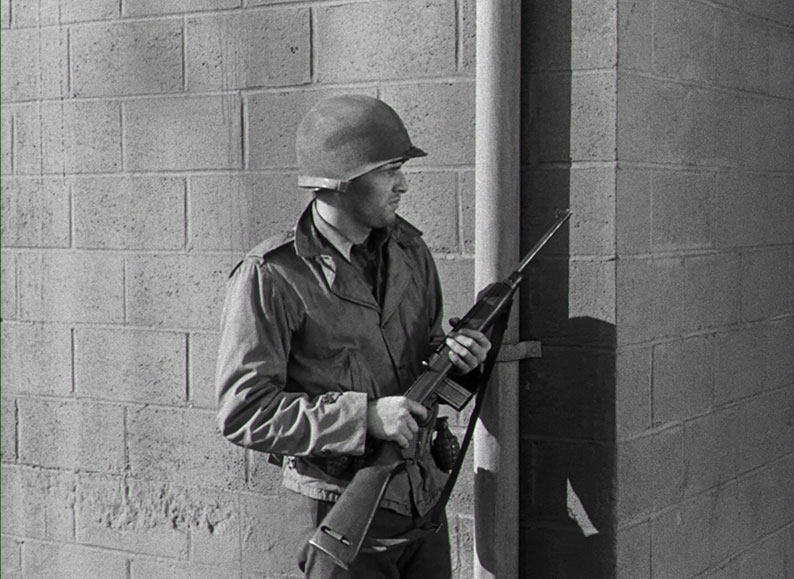|
The Men, released in 1950, is best-known now as Marlon Brando’s screen acting debut, and that’s certainly significant, but it’s a notable staging post in three other men’s careers: that of producer Stanley Kramer, screenwriter Carl Foreman and director Fred Zinnemann. It takes up the cause of war veterans, particularly those disabled in conflict: half a decade earlier, they had been heroes. Now, they were ignored, disregarded as they made people uncomfortable.
In its treatment of disabled war veterans and the theme of readjustment to civilian life, The Men is reminiscent of The Best Years of Your Lives, though on a smaller, less starry scale. That film also featured a genuinely disabled veteran in its principal cast, double hand amputee Harold Russell. The Men is informed by Zinnemann’s documentary background, and aims for realism throughout, which extended to setting much of it in a real hospital (the Birmingham Veterans’ Association Hospital in Van Nuys, California) with many real-life paraplegic patients and their doctors and nurses appearing in the film. One of the featured cast, Arthur Jurado (playing Angel), was a real-life paraplegic.
It’s also clear that the filmmakers felt they had an educational remit, as well as a duty for entertainment. After a short prologue which takes place during the opening credits, with the martial drumbeat of Dimitri Tiomkin’s score almost the only sound, we see Ken Wilocek (Brando) getting shot in the back, which leaves him paralysed from the waist down. We then cut to a lengthy sequence, where Dr Brock (Everett Sloane) talks to a group of women. These are the wives, mothers, fiancées and girlfriends of patients. One of them is Ellen (Teresa Wright), Ken’s fiancée. Brock details to quite some extent the physical implications of paraplegia – which includes likely sexual impotence, just about as frankly as could be done in a US film distributed by a major studio in 1950. With one stroke, any particular hint of sentimentality has gone. None, or almost none, of these men will ever walk again.

Kramer, Foreman and Zinnemann all shared a politically liberal viewpoint and Kramer in particular was often concerned with making films dealing with particular issues. There’s a sense that this led to films clearly aiming at a certain weight and heft – or, if you’re unsympathetic, self-importance. There is a sense of worthiness about much of his work, however fine the results, Judgment at Nuremberg in particular. Zinnemann was the oldest of the three men, but the least experienced in Hollywood. Zinnemann was born in Austria and arriving in the USA in 1929. He had worked in Germany on the documentary People on Sunday of that year, along with other Europeans who would also migrate to Hollywood, Billy Wilder, Edgar G. Ulmer and both Curt and Robert Siodmak among them. His first major work in the USA was The Seventh Cross in 1944, one of the first films to acknowledge the existence of concentration camps, while the war was still being fought. With The Search (1948) he dealt with the scars of the war years in Germany. The Men continued the theme, though in the USA. He went on to a distinguished later career, reteaming with Foreman and Kramer on the classic western High Noon, which was intended (as per Foreman, though Zinnemann disagreed) to be allegorical of Senator McCarthy’s anti-Communist witch-hunts of the time, which caused Foreman to be blacklisted. High Noon also shares with The Men the presence of Dimitri Tiomkin as score composer. He’s less effective here, with a more conventional “Hollywood” score not always matching the low-key realist approach – and Zinnemann thought the same when he first heard it.
Other than the fact that you see Ken in motion at the start, nowadays you might cast a real disabled actor in a film like this. Marlon Brando was of course able-bodied, but he owns the role from the outset. Brando, born in 1924, had studied acting with Stella Adler and was an exponent of the Stanislavski system of acting, prioritising emotions and experiences analogous to that of the character he or she is playing. Brando did not claim he was a “Method” actor (which was a term associated with the rival school run by Lee Strasberg), but along with other actors like Montgomery Clift, Brando became one of the most influential actors of his time by use of these techniques. By 1950 he had made his name on stage and was receiving film offers. The Man was the first one that he took up. Within a year, he was giving his force-of-nature performance as Stanley Kowalski in A Streetcar Named Desire, which he had played in the original Broadway production. Brando was probably at his height in the 1950s, and the first half of it at that, but he continued doing notable work, if less often. As Jim Hemphill points out in the commentary, in the one year two films came out: The Godfather (for which he won an Oscar, though he declined it) and Last Tango in Paris. One film in which he disappeared into the character, behind make-up and accent, and another in which he laid himself bare – maximum artifice on one hand, maximum soul-baring realism at the other. Brando has plenty of claims to be one of the great American screen actors of the twentieth century, and his influence was certainly heard on generations of actors who came next. The Men has strong work from Everett Sloane, and Teresa Wright, a major name in her own right at the time (The Best Years of Our Lives and Hitchcock’s Shadow of a Doubt), holds her own, but it’s Brando’s film. You can feel Ken’s frustration and anger, and his pent-up thwarted physicality. By its very nature, there cannot be a happy ending to this film – there is no miracle cure – but at the very end there is hope.

The Men picked up one Oscar nomination, for Foreman’s Story and Screenplay, losing to Sunset Boulevard. In the UK, it was BAFTA-nominated for Best Film from Any Source, which was won by All About Eve. You can’t really argue with either, but at least The Men was noticed and, while being an excellent film in its own right, gave notice of greater things to come from Foreman, Kramer and Brando.
The Men is released by the BFI on Blu-ray, a disc encoded for Region B only.
The film was given an A certificate in 1950 and is now a PG. As I mention above, there are claims that the film was initially banned by the BBFC, which Jim Hemphill mentions in his commentary. At the time, A was the highest certificate available, not counting the rarely-awarded H (for horrific), as the X was not introduced until 1951. The BBFC records their passing of the film on 7 July 1950, which was thirteen days before it opened in the USA. The scene which was the stumbling block (Dr Brock’s early talk to the women, with implications of sexual impotence in paraplegics) is certainly mentioned in the Monthly Film Bulletin review of November 1950, which suggests it wasn’t cut. Sight & Sound of December that year reviewed the film along with The Undefeated (see below – this piece is reprinted in the booklet) and does refer to the latter having had difficulties in being shown due to concerns about its subject matter. In fact, both Return to Action and The Undefeated were given U certificates at the time, but as they are documentaries they have been exempted from certification for this release.
The Men was shot in black and white 35mm and, as was standard for its time, Academy Ratio. The Blu-ray transfer is in the correct ratio of 1.37:1 from Paramount’s master. It looks fine: sharp and detailed, with contrast seemingly accurate and the grain natural and filmlike.
The soundtrack is the original mono, rendered as LPCM 2.0, and it’s a work of Hollywood professionalism, clear with dialogue, sound effects and music well balanced. English hard-of-hearing subtitles are available for the feature and, thankfully, for the two documentaries among the extras as well.
Commentary by Jim Hemphill
Hemphill has talked about Stanley Kramer before, namely his commentary track on the BFI’s 2020 release of Judgment at Nuremberg. This newly-recorded track is a very informed look at not just Kramer but Foreman and Zinnemann, as well as Brando and their work on The Men and its place in all their careers.

Carl Foreman interview (82:30)
This dates from 1969 – January of that year, in fact, as the interviewer wishes the audience a Happy New Year. As before on some BFI releases, information appears to be lacking on these relatively early audio pieces – not just the date, but also the identity of the interviewer. He’s male, and is addressed by Foreman as “David” (Robinson, possibly?). The interviewer states at the start that Foreman is the first writer to be honoured with an interview (though he had directed a film by then, 1963’s The Victors, his only film in that role) which is quite something when you consider that the National Film Theatre, as it was then called, opened in 1951. The interviewer says at the start that after one initial question, he’ll throw the interview over to the audience, and he does. Foreman is an engaging interviewee and we hear a lot about screenwriting and filmmaking, a little less about his blacklisting. Not all of the audience’s questions are easily audible, but they do get repeated in many cases. As usual with these recordings, film clips shown during the interview are edited out. The interview plays as an alternative audio track to the main feature, defaulting to the film audio after it finishes.
Return to Action (18:48)
The two short films on this disc are not specific to The Men, though The Undefeated (see below) does have links to it. However, they are both documentaries made by the Central Office of Information and are about the rehabilitation of disabled people – disabled men in all cases – to the workplace. Return to Action, made in 1947, takes us behind the Industrial Rehabilitation Centre at Egham, the Government Training Centre in Slough, and a training centre in Devon, all aiming to retrain people to rejoin the workplace – a pressing issue given that the number of men, women and children left disabled by the War numbered some 300,000.
The Undefeated (35:01)
This film takes up the theme three years later. It begins with subjective camera, and a narration spoken by Leo Genn, set up to enable a twist in the tail which isn’t too hard to guess. Our narrator tells us the story of Joe Anderson (played by Gerald Pearson, himself an amputee), who lost both legs in a plane crash and was deprived of the power of speech. We follow Anderson’s recovery of his voice, and his self-esteem. However, the film was found uncomfortable, and its release was held up for almost a year, finally opening in the same month as The Men.
Trailer (1:45)
It says “original trailer” on the menu, but that’s not the case. It may well be much the same as the original trailer, but it’s for a 1958 reissue under the changed title of Battle Stripe, in a double bill with the 1943 film The North Star, itself retitled Armored Attack. That sounds at first sight like a very gung-ho pairing, and you wonder what audiences in 1958 knew what to expect. This trailer does acknowledge the original title, but how many people unwitting went to see a films they’d seen before, eight and fifteen years earlier – and ones no doubt cropped from the original ratio as commercial cinemas could no longer show Academy? You can but wonder.

Stills gallery (2:15)
A self-navigating gallery of production stills.
Booklet
The BFI’s booklet, available in the first pressing only, runs to thirty-six pages. It begins with an essay, “The Lasting Wounds” by Philip Kemp, which ties The Men in to films with similar themes – disability, the treatment of veterans whether disabled or not – in films from both earlier and later. So, Kemp brings up The Best Years of Our Lives, but also Coming Home and even First Blood, but more recently still, Born on the Fourth of July, Clint Eastwood’s Flags of Our Fathers. It continues by discussing Johnny Got His Gun, the only film directed by another writer blacklisted in Hollywood, Dalton Trumbo. It ends by discussing John Huston’s documentary Let There Be Light. This is a rather different essay than the film-overview piece you might usually find in a BFI booklet, as it only discusses The Men at the start, before using it as a springboard to talking about the larger themes, but it’s an informative essay.
“Becoming Brando” by Victoria Millington is a biography of the actor, from his stage career in the 1940s, via his screen debut in The Men, and the seven films he made in the next four years, culminating in his first Oscar for On the Waterfront. The essay takes us up to his one and only film as director, One Eyed Jacks. Scott Harrison’s “Fred Zinnemann: Directing with Dignity” has a similar approach, taking the director from the beginning of his career to the mid-1950s, past The Men to High Noon and his big-budget Todd-AO musical Oklahoma! which was hardly typical of him, and a flawed film which wasn’t a box office success. The booklet also includes full film credits, a reprint of Richard Winnington’s Sight & Sound piece on The Men and The Undefeated, credits of and notes on the extras, and stills.
Released in 1950, The Men is a key film in several men’s careers, not just Brando, one of the greatest and most influential of all American screen actors of the coming decade, but also Stanley Kramer, Carl Foreman and Fred Zinnemann. It remains a powerful and affecting film, quite tough-minded and franker than many Hollywood films of the time were. It’s well presented on this BFI Blu-ray.
|